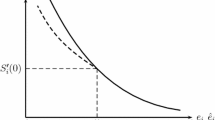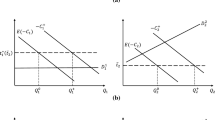Abstract
We study the cost-effectiveness of inducing compliance in a program that caps aggregate emissions of a given pollutant from a set of heterogeneous firms based on emissions standards and the relative cost-effectiveness of such a program with respect to an optimally designed program based on tradable discharge permits. Our analysis considers abatement, monitoring and sanctioning costs, as well as perfect and imperfect information on the part of the regulator with regard to the polluters’ abatement costs. Under perfect information we find that (a) the total-cost-effective design of a program based on standards is one in which the standards are firm specific and perfectly enforced, and (b) the total cost of an optimally designed program based on standards is lower than the total cost of an optimally designed transferable emission permits system, except under special conditions. This is true when it is optimum to induce perfect compliance and when it is not. Under imperfect information, nevertheless, it is only by implementing a system of tradable permits and perfectly enforcing it with a constant marginal penalty tied to the price of the permits, that the regulator can surmount the informational problem and at the same time minimize the total cost of the program with certainty.
Similar content being viewed by others
References
Arguedas C (2008) To comply or not to comply? Pollution standard setting under costly monitoring and sanctioning. Environ Resour Econ 41: 155–168
Becker GS (1968) Crime and punishment: an economic approach. J Pol Econ 76: 169–217
Chávez CA, Villena MC, Stranlund JK (2009) The choice of policy instruments to control pollution under costly enforcement and incomplete information. J Appl Econ 12: 207–227
Goulder LH, Parry IWH (2008) Instrument choice in environmental policy. Rev Environ Econ Pol 2: 152–174
Hahn R, Axtell R (1995) Reevaluating the relationship between transferable property rights and command and control regulations. J Regul Econ 8: 125–148
Harford JD (1978) Firm behavior under imperfectly enforceable pollution standards and taxes. J Environ Econ Manage 5: 26–43
Heyes AG (1994) Environmental enforcement when “inspectability” is endogenous: a model with overshooting properties. Environ Resour Econ 4: 479–494
Jost P (1997a) Regulatory enforcement in the presence of a court system. Int Rev Law Econ 17: 491–508
Jost P (1997b) Monitoring, appeal and investigation: the enforcement of the legal process. J Regul Econ 12: 127–146
Kambhu J (1989) Regulatory standards, non-compliance and enforcement. J Regul Econ 1: 103–114
Malik A (1992) Enforcement cost and the choice of policy instruments for controlling pollution. Econ Inq 30: 714–721
Segerson K, Tietenberg T (1992) The structure of penalties in environmental enforcement: an economic analysis. J Environ Econ Manage 23: 179–200
Stranlund JK (2007) The regulatory choice of noncompliance in emissions trading programs. Environ Resour Econ 38: 99–117
Stranlund JK, Dhanda K (1999) Endogenous monitoring and enforcement of a transferable emissions permit system. J Environ Econ Manage 38: 267–282
Stranlund JK, Chavez CA, Villena MG (2009) The optimal pricing of pollution when enforcement is costly. J Environ Econ Manage 58: 183–191
Author information
Authors and Affiliations
Corresponding author
Rights and permissions
About this article
Cite this article
Caffera, M., Chávez, C.A. The Cost-Effective Choice of Policy Instruments to Cap Aggregate Emissions with Costly Enforcement. Environ Resource Econ 50, 531–557 (2011). https://doi.org/10.1007/s10640-011-9481-y
Accepted:
Published:
Issue Date:
DOI: https://doi.org/10.1007/s10640-011-9481-y




